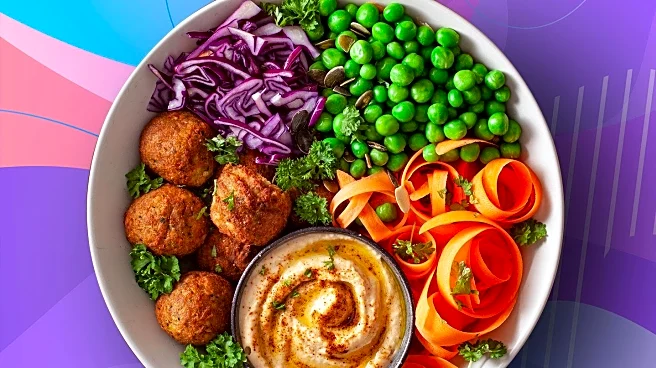What is the story about?
What's Happening?
Vegetarian meal delivery services are gaining traction as a convenient solution for those seeking to maintain a meatless diet without sacrificing flavor or nutrition. Companies like Purple Carrot, Green Chef, HelloFresh, Factor, Hungryroot, and CookUnity are leading the charge by offering a variety of meal kits and prepared meals tailored to different dietary needs. These services provide options ranging from high-protein and keto-friendly meals to gluten-free and weight-loss-focused plans. Purple Carrot, for instance, is known for its plant-based, protein-rich meals, while Green Chef offers USDA-certified organic ingredients with a focus on creative, globally inspired recipes. HelloFresh provides budget-friendly, beginner-friendly options, and Factor specializes in ready-to-eat meals that require no preparation. Hungryroot combines grocery delivery with meal kits, emphasizing whole food ingredients, and CookUnity offers chef-created, restaurant-quality meals with gluten-free options.
Why It's Important?
The rise of vegetarian meal delivery services reflects a growing demand for convenient, healthy eating options that cater to diverse dietary preferences. These services not only simplify meal preparation for busy individuals but also promote sustainable eating habits by reducing reliance on meat. By offering a range of options, from high-protein to gluten-free meals, these companies cater to a wide audience, including those with specific health goals or dietary restrictions. This trend also highlights a shift in consumer behavior towards more plant-based diets, which can have positive implications for public health and environmental sustainability. As more people seek to incorporate vegetarian meals into their diets, these services provide an accessible way to explore new flavors and cuisines without the hassle of traditional meal planning and grocery shopping.
What's Next?
As the demand for vegetarian meal delivery services continues to grow, companies are likely to expand their offerings to include more diverse and customizable options. This could involve the introduction of new meal plans that cater to emerging dietary trends or the development of partnerships with local chefs to offer regionally inspired dishes. Additionally, advancements in food technology and logistics may enable these services to improve the freshness and quality of their ingredients while reducing costs. As competition in the meal delivery market intensifies, companies will need to innovate and differentiate themselves to attract and retain customers. This could lead to more personalized meal plans, enhanced user experiences, and greater transparency in sourcing and sustainability practices.
















